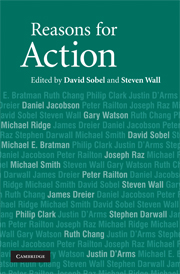Book contents
- Frontmatter
- Contents
- Notes on the contributors
- Acknowledgments
- 1 Introduction
- 2 Intention, belief, and instrumental rationality
- 3 Reasons: practical and adaptive
- 4 The explanatory role of being rational
- 5 Practical competence and fluent agency
- 6 Practical conditionals
- 7 Authority and second-personal reasons for acting
- 8 Promises, reasons, and normative powers
- 9 Regret and irrational action
- 10 Mackie's motivational argument
- 11 The truth in Ecumenical Expressivism
- 12 Voluntarist reasons and the sources of normativity
- Bibliography
- Index
1 - Introduction
Published online by Cambridge University Press: 05 May 2010
- Frontmatter
- Contents
- Notes on the contributors
- Acknowledgments
- 1 Introduction
- 2 Intention, belief, and instrumental rationality
- 3 Reasons: practical and adaptive
- 4 The explanatory role of being rational
- 5 Practical competence and fluent agency
- 6 Practical conditionals
- 7 Authority and second-personal reasons for acting
- 8 Promises, reasons, and normative powers
- 9 Regret and irrational action
- 10 Mackie's motivational argument
- 11 The truth in Ecumenical Expressivism
- 12 Voluntarist reasons and the sources of normativity
- Bibliography
- Index
Summary
Philosophical reflection on practical reason and practical rationality is expanding in all directions. The work being done under these headings has become so broad and diverse that it is difficult to say much useful about the whole area. We will not try. Rather we shall pick a few points of entry into the discussions and try to situate some of the chapters in this volume within these frameworks.
PRACTICAL AND THEORETICAL RATIONALITY
Normative reasons are facts that count in favor of doing some action, believing some claim, or having some attitude or emotion. Rationality refers to a capacity to recognize and respond appropriately to these facts (or one's take on these facts). There can be more or less demanding standards of rationality. On a common view, a person acts rationally if she does something that, were her beliefs true, she would have sufficient reason to do. On this view, what it is rational for a person to do depends on her beliefs. This brings out an important dependence of practical rationality on theoretical rationality.
It is natural to wonder how significant are the differences between practical and theoretical rationality. Recently, some philosophers have argued that the differences are not as significant as they first appear. The demands of practical rationality, they argue, can be explained in terms of the requirements of theoretical rationality.
- Type
- Chapter
- Information
- Reasons for Action , pp. 1 - 12Publisher: Cambridge University PressPrint publication year: 2009

